Edgar Aviña, Shoshana Davidoff-Gore, Caitlin Dermody, Daniel Vernick
Introduction
For years, politicians, educators, and parents alike have engaged in the great charter school debate. Functioning in the space between privatization and public funding, charter management organizations (CMOs) can be filled with mystery beyond the specifics of their structure. Recently, the American media has latched onto this fact, often using the stories of either a star student or a fraudulent CMO on their front page. However, only one CMO in the United States is connected to a self-exiled Turkish cleric, a coup d’etat, and a U.S. investigation—the Gulen charter schools network.
In this report, we formulate a brief account of Gulen Schools in America. Through the study of five specific Gulen schools and an overview of data collected on the Gulen movement, we study the organization of these schools, their educational practices, and their value for American students. We find that students in Gulen schools are outperforming their peers in public school districts, and, in spite of a less-than-transparent connection with Turkey and Fethullah Gulen, Gulen schools provide a completely secular education based on the advancement of STEM skills.
Methodology
There is no one source which comprehensively documents the demographic statistics, discipline trends, and tests scores of the Gulen Schools network as a whole. Therefore, it was necessary to randomly select Gulen schools to examine more carefully. To generate this list of five schools, we copied and pasted a comprehensive list of all Gulen linked schools (sourced from a blog called Charter School Scandals, curated by education blogger Sharon Higgins) into an Excel sheet which automatically assigns a number to each school (the first school is in row 1, and so on). We then used a random number generator to get five numbers, which we then cross-referenced with the Excel sheet to determine a list of five schools. To obtain the qualitative information for this report, we used online articles about the Gulen Schools Network as well as information from each school’s’ individual website. The quantitative data presented in this report was acquired from the databases of the federal Office of Civil Rights and US News and World Report.
History, Pedagogy, Mission of Gulen Schools
Gulen charter schools stem from a larger religious and political movement known as the Gulen Movement. The movement was started by Imam Fethullah Gulen, born and raised in Turkey, who has been an active religious leader since the 1960s and 70s. Gulen preaches from the Sunni tradition of Islam and encourages cooperation and tolerance, as well as the importance of a comprehensive secular education outside of religious teachings. Although the schools receive no direct oversight from Gulen himself, they were founded as an extension of hizmet, meaning “the service”, which is an alternate name for the movement as well as its primary principle. Providing an excellent education is seen as a fulfillment of service to others, and the schools emphasize math and science, with no religious indoctrination.
According to a website created and endorsed by the Gulen Movement, the first Gulen schools were established in Turkey to help students prepare for University in the late 1970s and early 1980s. In the early 90s, as the Soviet Union dissolved, businessmen and educators traveled to other nations in Central Asia to establish more schools. Today, there are Gulen schools and cultural centers on six continents that serve over 2 million students.
In the United States, there are currently 167 charter schools that are likely linked with the Gulen Movement in 26 states and Washington D.C, making it one of the largest charter school organizations in the country. (Due to the lack of explicit connections between the Gulen Movement and many of its charter schools, it is difficult to give a definitive number. Other sources claim that there are between 120 and 135 US Gulen Charters). In 2012, the schools enrolled more than 45,000 students, but the number has likely increased in the years since.
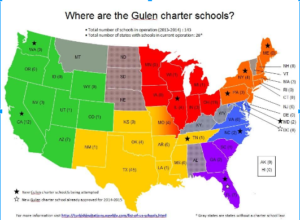
In practice, the Gulen movement seems to manifest most explicitly as an ideology- principles of public service and secular knowledge that inspire and guide supporters of Fethullah Gulen as they set up smaller CMOs in individual cities. In Texas, for example, the Gulen associated CMO is called Harmony Public Schools, which operates over fifty charter schools across the state. The CMO was founded by Turkish-American graduate student Dr. Soner Tarim, and the network does hire international (read Turkish) teachers, the CMO explicitly denies any religious affiliation. However, the Gulen associated schools in other parts of the country are run by separate CMOs, like Magnolia Public Schools in California, which have a completely different organizational system.
While there is an immense number of schools associated with the Gulen movement, most do not advertise an explicit connection, either on public internet sources or when asked directly. Looking at websites for many of these US charters, it would be impossible to detect the connection without prior knowledge. This is likely in-part to prevent increased Islamophobia that could be catalyzed by an explicit connection with Gulen and Turkey. Another possibility is that the schools are truly not connected with Fethullah Gulen himself, and thus do not have any reason to advertise themselves as such. Given this lack of transparency, it is also difficult to pinpoint pedagogy that is consistent between Gulen schools and each CMO. There is a clear focus on math and science in many of the schools, with an emphasis on technology and innovation, but each regional CMO has its own mission and vision.
Marketing
As previously mentioned, no Gulen school markets itself as an associate of the Gulen movement. The schools are run out of a variety of charter management organizations, including Magnolia in California, Harmony in Texas, Horizon Science Academy in Illinois , and Sonora in Arizona to name a few. Each charter network advertises their schools slightly differently on their website. Magnolia has an added focus on the “arts”, Harmony is committed to creating “safe environments”, and Sonoran schools emphasize “excellence.” However, all of the schools market themselves through one common mission: to support STEM, Science, Technology, Engineering and Math educations for today’s students. According to the charter’s websites, it is the study of these subjects that increases students success in “college, the workplace, and the 21st century.” Each website cites a desire to produce “global effects” or “world leaders” as a secondary goal of their schools’ missions. Despite no mention of “Gulen” on any of the webpages, the mission of these schools draws direct parallels to the teachings of Fettaluah Gulen, himself. Fettaluah Gulen has preached that “Studying physics, mathematics, and chemistry is worshipping God.” He also often emphasizes the path of a universal community around the globe.
Demographics
Although many teachers in Gulen schools are Turkish, Gulen Schools serve a wide variety of student populations. As shown by the graph to the right, they tend to either overpass or match the enrollment of students of color of their districts. Only the Harmony School of Advancement sports a lower rate of diversity than its district. Latinos are the largest ethnic group in the charter schools, but they are not present in any school at a rate higher than 70 percent (also note that five of the six are located in majority-Latino cities: Los Angeles, Houston, and San Antonio).
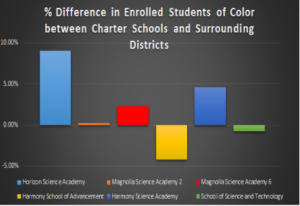
 A comparison of the free and reduced lunch data of Gulen schools and their surrounding districts makes it clear that Gulen Schools are not serving the highest-poverty students in their areas, but that they are serving moderately needy students. In other words, Gulen schools are serving needy students, but not the most needy in their areas. This distinction is important, and it emerges fr
A comparison of the free and reduced lunch data of Gulen schools and their surrounding districts makes it clear that Gulen Schools are not serving the highest-poverty students in their areas, but that they are serving moderately needy students. In other words, Gulen schools are serving needy students, but not the most needy in their areas. This distinction is important, and it emerges fr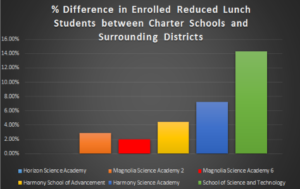 om the fact that Gulen schools enroll much fewer free lunch students (The School of Science and Technology in San Antonio enrolls a whopping 50% less free lunch students) but also tend to serve more reduced lunch students than their surrounding districts, as shown in the graphs above. These differences illustrate how Gulen can rightfully claim that it is serving “low-income students” — reduced lunch students are still classified as such — while also, in effect, not serving the most high-need students (free lunch students).
om the fact that Gulen schools enroll much fewer free lunch students (The School of Science and Technology in San Antonio enrolls a whopping 50% less free lunch students) but also tend to serve more reduced lunch students than their surrounding districts, as shown in the graphs above. These differences illustrate how Gulen can rightfully claim that it is serving “low-income students” — reduced lunch students are still classified as such — while also, in effect, not serving the most high-need students (free lunch students).
School Districts
As mentioned above, the Gulen schools generally represents the demographics of their school district. When considering how the Gulen Schools affects the school district, one must understand that one of the largest complaints against CMOs is their use of funds taken from public schools. As one of the largest CMO networks in the country, this argument is often heightened. However, despite these usual claims, The largest impact on the surrounding district has often come through news stories about the schools questionable practices. For example, one teacher, Mary Addidi, was fired from her school in Cleveland, Ohio just to be replaced by a Turkish teacher. In 2014, the FBI examined 19 Gulen schools for “undisclosed reasons.” This did not come as a surprise too many. The schools are a direct way for the Gulen movement to (1) make money, (2) influence students, (3) connect with politicians, and (4) certify Turkish citizens immigration to America. For example, 152 state legislatures toured Turkey through funding from Gulen organizations from 2006 to 2015. Some claim that the profit of the Gulen schools, run through public funding, may have funded these trips.These schools are often considered to serve as profit creators and support suppliers for the Gulen movement. However, when perusing the Internet for examples of these fraudulent aspects, the success stories of Gulen students. There are two narratives that appear for Gulen schools: (1) an exploitation of academics for a illegal purpose and (2) highly performing schools where all students excel.
School Achievement
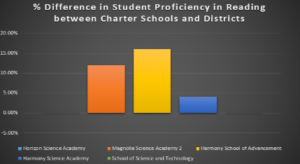
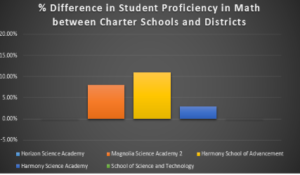
The cross-section of Gulen Schools that we have examined have consistently outperformed their home states, and drawn even with or outperformed their surrounding districts (No achievement data was found on three of the schools). As shown in the graphs on the previous page, Horizon Science Academy in Cleveland and the School of Science and Technology in San Antonio report test scores that are roughly equal with those of their surrounding district in math and reading. The two Harmony Schools in Houston and the Magnolia Academy in Los Angeles have outshone their respective districts in both math and reading. It is noteworthy that none of the schools are falling behind their respective district.
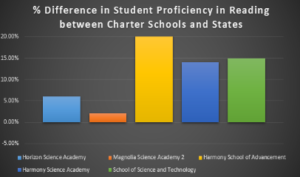
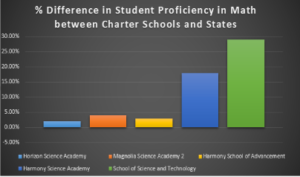
The Gulen schools consistently outperformed their surrounding states. What is particularly impressive is the performance of the School of Science and Technology in San Antonio, where the percent difference in student proficiency rates in math between the school and the state of Texas was a whopping 29%. What’s noteworthy about this set of graphs is that it shows that some Gulen schools have particular areas of strength. For example, the School of Science and Technology excelled in math, which makes sense in light of its name and mission. The Harmony School of Advancement, which has less of STEM focus than other schools in the network, did phenomenally in reading, but comparatively less well in math. Overall, the performance of the Gulen schools is satisfactory, although it is clear that some have more room for growth.
Discipline
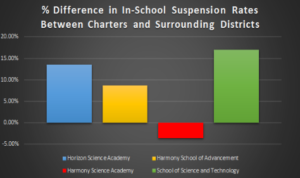
Within Gulen Schools, Discipline often varies. There is variability in the rates of in-school suspension. Three of the six Gulen charter schools we studied had substantially higher suspension rates than the surrounding districts. One, Harmony Science Academy in Houston, sported a lower suspension rate than the surrounding Houston school district. Two Gulen charter schools in Los Angeles suspended not a single student; this low rate of suspensions may be rooted in a larger trend in Los Angeles which has seen a sharp drop in suspensions.
While the lack of suspensions in the Magnolia schools may very well be rooted in the wider downward trend of suspensions in Los Angeles, the root causes of the variability in the other schools is harder to discern. Harmony School of Advancement boasts of “Discipline with Character” that “reaffirms our strength as a drug free, gang-free, peer pressure-free, bully-free, truancy-free, fight-free and crime-free campus.” The Horizon Science Academy merely notes that it wants to “maintain an enriching, safe environment.” School of Science and Technology only notes that it wants to maintain a “dynamic” learning environment.
Funding
The FBI is currently investigating whether Gulen and his followers have taken funding from the charter schools “to fund his movement in Turkey.” One senior State Department official said Gulen schools and charities in America “look a lot like the ways in which organized crime sets itself up…to hide money for money laundering.” Former Gulen teachers say that there is a “scheme by Gulen’s followers to take advantage of the American charter school system and fund Gulen’s movement.” For instance, former Gulen follower and Gulen school math teacher Ersin Konkur said that the school administration made Turkish teachers give a portion of their salary back to the school. Konkur said, “they were asking for cash [from the teachers].” Konkur paid around 20,000 throughout his time as a teacher.
Mustafa Emanet, who works at a Gulen-linked school in Ohio, said that he had to give 40% of his salary back to the administration. The FBI thinks that administration at Emanet’s school “illegally paid themselves 5 million in federal contracts and then sent those US tax dollars to Bank Asya, a bank in Turkey linked to Gulen’s followers.” Alp Aslandogan, Gulen’s closest advisor, said that those allegations are completely false and that if teachers were forced to pay a portion of their salary, “Gulen would be the first to condemn it,” saying the investigation is politically motivated.
The Turkish government hired lawyers to encourage the Texas Education Agency (TEA) to investigate Harmony Public Schools, which is the largest Texas charter school network and a Gulen-linked CMO, serving 31,000 students in 46 schools across Texas. The Turkish government alleges that “Harmony hires under-qualified Turkish teachers” and directs “business toward companies run by Turkish nationals.” Harmony schools CEO Soner Tarim called the lawsuit “ridiculous and baseless,” and said that it’s a political attack by President Erdogan. TEA is currently assessing the complaint.
Funding for Gulen-linked charter districts varies depending on the CMO, but largely comes from a few central sources. Austin’s 2016-17 Harmony schools budget, for instance, received 32.9 million from the Foundation School Program, which is Texas’s main source of state education funding. Another 2 million came in federal funding distributed by the TEA, and smaller amounts include $719,000 from the National School Lunch Program and $125,000 from the National School Breakfast Program. Only $292,696 came from local tax revenue. Other schools had similar funding sources and revenue proportions.
Staffing
Gulen-linked charter districts offer similar descriptions of their teaching opportunities and work environment. Harmony Public Schools, for instance, encourages teachers to apply for a job for “personal growth and professional success,” and encourages “recent graduates or experienced professionals seeking new career opportunities” to apply. There is a clear emphasis on teachers new to the profession. This implies that Harmony seeks to mold teachers to their unique model, which emphasizes a math and science-based curriculum and a “culture of competition, discipline, and parental engagement.” Harmony’s emphasizes “opportunities for advancement [and] career growth” but fails to mention virtually anything about students. Salaries range from 20,000 for a teacher aide to 47,780 for a high school teacher to 74,001 for a software developer. The starting salary varies depending on the cost of living in the location of the school. Similarly, the Gulen-linked charter CMO called Magnolia Public Schools highlights the ability for teachers to “reach their full potential” and to “build and advance [their] career,” emphasizing personal careers but leaving out any discussion of the ability to make a difference in students’ lives.
A variety of staffing issues have arisen with various Gulen CMOs. Complaints from teacher unions in Illinois and Ohio accusing Gulen-linked CMOs of violating the visa program by favoring Turkish over American teachers have spurred a Department of Labor investigation. Three Los Angeles Magnolia charters are at risk of being shut down because they bring in teachers from Turkey, using temporary work visas. In 2016, the LA School Board noted that it was concerned that Magnolia schools applied for visas for 138 teachers, funding all their travel costs including $3000 per person visa costs for the teacher and their family members. Spending $929,000 of taxpayer dollars to import large numbers of teachers from Turkey, paired with the “failure to disclose the hiring strategy,” has aroused suspicion. Furthermore, the work visas the Turkish teachers had are only supposed to be used “when no qualified American job seekers can be found.” The hiring patterns at Magnolia schools were replicated in most of the 136 Gulen-linked schools across the country.
Another complaint is that Magnolia didn’t “turn over all requested documentation.” The chair of LA School Board says that Magnolia never said told the school board that it would bring teachers from Turkey. Now that the school is up for reauthorization, school board head Steve Zimmerer says that Magnolia didn’t necessarily “follow the instructional and business practices outlined in its petition.” The Magnolia CEO said that those involved in the scandal should be brought to justice, but that the Magnolia schools shouldn’t close because doing so would punish students who did nothing wrong.
Accountability
Harmony schools are effective at teaching students, but their transparency and accountability to taxpayers and the American people must be improved. Many are highly-ranked in national ratings, and the waiting list is equivalent to the entire student body at all the Harmony schools. However, many controversies have recently arisen. A 2014 lawsuit accused Harmony Public Schools of paying male Turkish teachers more than female and non-Turkish teachers, even than those with more experience. In 2014, Harmony schools reached a settlement with the Education Department regarding teaching of ELL students and students with disabilities. An investigation found that there are far fewer of those students at Harmony schools than at public schools, and Harmony schools didn’t provide them with the appropriate support.
At Harmony and other Gulen schools, contracts and purchases from school lunches to teacher training are awarded to Turkish businesses. The vast majority of construction on Harmony schools has been done by Turkish companies, even though local American companies have bid hundreds of thousands of dollars lower in some cases. For instance, TDM Contracting was awarded an 8.2 million contract to build a new Harmony charter in San Antonio, despite the fact that the company was only 1 month old. Gulen schools have also used taxpayer dollars to benefit “local foundations that that promote Gulen teaching and Turkish culture.”
Greater monitoring and accountability for Gulen-linked schools is clearly imperative. In addition to investigations by the FBI, Department of Education, and Department of Labor, numerous scandals abound. A Pennsylvania Gulen-linked school, called Truebright, had a discrimination lawsuit filed against it in 2013. A former English teacher at Truebright began the civil rights lawsuit, which claimed that the school “discriminated against employees based on gender and national origin.” Nine Truebright teachers also “filed initial discrimination complaints” with the Equal Employment Opportunity Commission. The charter ended up not being reauthorized. In another case, Lancaster, PA rejected an application for a Gulen-linked charter due to application mistakes such as “carelessness and numerous cut and paste segments from other charter school applications which had no relevance to the application,” as well as a “total lack of knowledge” in curriculum planning. A 2008 investigation of an Ohio Gulen-linked school was begun by the Department of Labor about H1-B visas for teachers. The budget included money paid to people in Turkey, including people that had never worked for the school. 13,000 in “illegal immigration fees” were listed, and the school building is leased from a landlord that lives in Turkey.
Pioneer Charter School of Science in MA was praised as a model charter, but had a very high attrition rate, especially among people with disabilities. The school hired Turkish teachers while at the same time there was intense competition for teaching spots at other MA charters. 56.7% of teachers at Pioneer Charter were licensed in what they were teaching, but in public schools of the same town 99.5% of teachers were licensed. Gulen-linked schools are often high-performing in terms of student achievement. But in order to maintain credibility and long-term sustainability, the schools must ensure that their administrative decisions are accountable to taxpayers and to the government.
Conclusion
The high test score results of the Gulen schools suggest that this network is doing a competent job of education children. However, it must be remembered that the goal of education is far greater than for students to do well on tests. Students must learn in an environment that implicitly fosters growth of their whole being. Standardized test results often have limited bearing on the quality of education that a student is receiving. However, the environment and greater mission of a school implicitly affects students in everything that they do.
Gulen schools have become embroiled in scandal and controversy. While schools disassociate themselves from Gulen himself, many administration officials in his charter schools are connected to him and his religious-political cult. Numerous Gulen schools across the country are under investigation by the FBI, the Department of Education, and/or the Department of Labor. The allegations are wide-ranging, from paying female and non-Turkish teachers less than male Turks to favoring Turkish companies for construction of school buildings despite lower bids from American businesses, and forcing teachers brought over from Turkey to give a certain portion of their salary to Gulen political leaders in Turkey. Thus, despite high test scores, the Gulen schools appear to be implicated in a greater scandal that would most likely affect the students’ abilities to receive an education solely focusing on the student’s growth academically, intellectually, and socially.
Works Cited
“Addendum: Documentation of Scandals Involving Gulen Schools.” The Hayride. Web. 31 Mar. 2017.
“About Us .” Harmony Public Schools. Accessed March 24, 2017.
http://www.harmonytx.org/AboutUs.aspx.
“About MPS.” Magnolia Public Schools. Accessed March 24, 2017.
http://www.magnoliapublicschools.org/apps/pages/index.jsp?uREC_ID=284159&type=d.
Armario, Christine. “Los Angeles policy shift yields decline in school suspensions.” Los Angeles Daily
News. January 10, 2015. Accessed March 31, 2017. http://www.dailynews.com/social-affairs/20150110/los-angeles-policy-shift-yields-decline-in-school-suspensions.
“Blue Mass Group.” Blue Mass Group Outsourcing Massachusetts Charter School Teaching Jobs: Say It Isn’t so Comments. Web. 31 Mar. 2017.
Dealer, John Caniglia The Plain. “FBI agents in Cleveland examining Illinois business that runs charter schools.” Cleveland.com. June 09, 2014. Accessed April 01, 2017. http://www.cleveland.com/court-justice/index.ssf/2014/06/fbi_agents_in_cleveland_examin.html.
Gladstone, Rick. “Turkish Cleric, Accused in Coup Plot, Calls Crackdown ‘Dark Pages’ in History.” The
New York Times. September 15, 2016. Accessed March 26, 2017.
https://www.nytimes.com/2016/09/16/world/middleeast/turkey-fethullah-gulen-coup.html.
“Harmony Public Schools:Campuses.” Harmony Public Schools. 2017. http://www.harmonytx.org/Schools.aspx.
Harmony Public Schools, “2016-2017 Fiscal Year Budget” Harmony Public Schools – Austin, Austin, TX, , http://www.harmonytx.org/Documents/Budgets/HPS_Austin_2016_17_Budget.pdf.
“Harmony Public Schools.” Jobs. Accessed April 04, 2017. https://www.indeed.com/cmp/Harmony-Public-Schools/salaries.
Schools, Harmony Public. “Why Work at Harmony?” Harmony Public Schools | Careers. Accessed April 04, 2017. http://www.harmonytx.org/hr.aspx.
Janisch, Margaret Brennan Jennifer. “Are Some U.S. Charter Schools Helping Fund Controversial Turkish Cleric’s Movement?” CBS News. 29 Mar. 2017. Web. 31 Mar. 2017.
“List of Gulen-linked charter schools in 2016-2017.” Charter School Scandals. 2016. http://charterschoolscandals.blogspot.com/p/list-of-us-gulen-schools.html.
Liz Essley Whyte, The Center for Public Integrity. “Turkish opposition subsidizes scores of state lawmakers’ trips.” USA Today. February 17, 2017. Accessed April 01, 2017. https://www.usatoday.com/story/news/politics/2017/02/09/state-legislators-trips-to-turkey/97602934/.\
National Rankings. “How Does Harmony Science Academy (Houston) Perform on Tests?” U.S. News
& World Report. Accessed March 27, 2017.
https://www.usnews.com/education/best-high-schools/texas/districts/harmony-science-academy/
harmony-science-academy-houston-18461/test-scores.
National Rankings. “How Does Harmony School of Advancement – High Perform on Tests?” U.S. News
& World Report. Accessed March 27, 2017. https://www.usnews.com/education/best-high-schools/texas/districts/harmony-school-of-excellence/harmony-school-of-advancement-high-92252/test-scores.
National Rankings. “How Does Magnolia Science Academy 2 Perform on Tests?” U.S. News & World
Report. Accessed March 27, 2017. https://www.usnews.com/education/best-high-schools/california/districts/los-angeles-unified-school-district/magnolia-science-academy-2-139201/test-scores.
National Rankings. “How Does Horizon Academy Perform on Tests?” U.S. News & World
Report. Accessed March 27, 2017. http://messaging.usnews.com/education/best-high-schools/ohio/districts/horizon-science-acad-cleveland/horizon-science-acad-cleveland-14967.
“Mission/Vision & History.” Mission/Vision & History. Accessed March 25, 2017.
http://www.sonoranschools.org/History.aspx.
“Philly.com Archive Hub.” Archives – Philly.com. Web. 31 Mar. 2017.
“Three L.A. Charter Schools Could Be Shut Down, Largely Because of Their Practice of Bringing in Teachers from Turkey.” Los Angeles Times. Los Angeles Times. Web. 27 Mar. 2017.
“Top Texas Charter School Network Accused of Bias, Self-dealing | News.” Dallas News. 24 May 2016. Web. 31 Mar. 2017.
Wilson, Terri S., and Robert L. Carlsen. “School Marketing as a Sorting Mechanism: A Critical Discourse Analysis of Charter School Websites.” Peabody Journal of Education 91, no. 1 (2016): 24-46. Accessed March 23, 2017. doi:10.1080/0161956x.2016.1119564.
Working for Magnolia Public Schools. Los Angeles, 2017. Available from http://www.magnoliapublicschools.org/apps/pages/index.jsp?uREC_ID=284771&type=d.
“U.S. charter schools tied to powerful Turkish imam.” CBS News. May 13, 2012. Accessed
March 26, 2017. http://www.cbsnews.com/news/us-charter-schools-tied-to-powerful-turkish-imam/.
